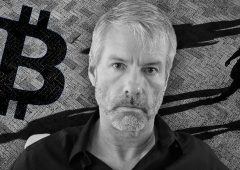Traders on Polymarket Are Doubling Down on XRP’s ETF Approval
26.05.2025 10:00 1 min. read Alexander Stefanov
Despite regulatory hesitation, confidence is mounting around the launch of a spot XRP ETF.
Prediction markets now reflect an 83% chance of approval—up sharply from 70% just days ago—even as the U.S. Securities and Exchange Commission pushes final decisions into the fall.
The rising optimism hasn’t been dampened by the SEC’s routine delays affecting major players like Grayscale, Bitwise, and Franklin Templeton. Analysts familiar with the review process say this kind of stall is typical and doesn’t necessarily reflect opposition.
Behind the scenes, institutions are preparing for the inevitable. Ripple CEO Brad Garlinghouse recently highlighted how ETFs are bridging the gap between crypto and traditional finance, offering exposure through familiar, regulated products rather than wallets and exchanges. He pointed to the explosive growth of Bitcoin ETFs as evidence of investor appetite.
While a spot product for XRP is still pending, futures-based offerings are already gaining ground. Volatility Shares launched the first XRP futures ETF on Nasdaq, and CME followed with its own product. Meanwhile, leveraged instruments like Tectrium’s 2x long XRP ETF are adding momentum.
With more institutional-grade tools entering the market, XRP’s integration into the mainstream financial system may be closer than it seems—whether or not the SEC gives its blessing in the near term.
-
1
Whale Activity Alert: Which Altcoins Saw Millions Flow Into Exchanges?
09.07.2025 9:00 2 min. read -
2
Bitcoin Rises as Thousands of Altcoins Disappear
07.07.2025 13:00 2 min. read -
3
Binance Launches New Airdrop Rewards for BNB Holders
09.07.2025 18:00 2 min. read -
4
Ethereum nears key resistance as analysts predict $3,500 surge
13.07.2025 20:00 2 min. read -
5
Here is How Ethereum Can Change Wall Street, According to ETH Co-founder
09.07.2025 10:00 2 min. read
Solana Reclaims $200 as Short Squeeze, ETF hopes, and Institutional Flows Collide
Solana surged 5.6% to reclaim the $200 level for the first time since February, fueled by a confluence of bullish technical, fundamental, and institutional catalysts.
Top trending tokens today: WEMIX, Drift and TRUMP Coin
CoinMarketCap’s momentum algorithm is flashing strong upside signals for several fast-moving tokens. WEMIX, Drift, and OFFICIAL TRUMP Coin top today’s trending list, each driven by unique catalysts—from GameFi upgrades and DeFi volume surges to political tailwinds.
Altcoin Season Signals Strengthen as Institutional Flows Accelerate
According to QCP Capital’s latest report, altcoin season may have finally arrived.
Solana Price Prediction: SOL Could be Ready to Move to $225 After Breakout
Solana (SOL) has gone up by 35% in the past 30 days as multiple tailwinds have lifted the price of this top altcoin above the $190 level. A breakout above this level favors a bullish Solana price prediction as it could anticipate a big move ahead, especially at a point when market conditions are favorable. […]
-
1
Whale Activity Alert: Which Altcoins Saw Millions Flow Into Exchanges?
09.07.2025 9:00 2 min. read -
2
Bitcoin Rises as Thousands of Altcoins Disappear
07.07.2025 13:00 2 min. read -
3
Binance Launches New Airdrop Rewards for BNB Holders
09.07.2025 18:00 2 min. read -
4
Ethereum nears key resistance as analysts predict $3,500 surge
13.07.2025 20:00 2 min. read -
5
Here is How Ethereum Can Change Wall Street, According to ETH Co-founder
09.07.2025 10:00 2 min. read


